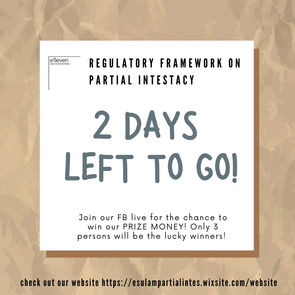_edited.jpg)
SHARING SESSION
Our first session started with the discussion in regards to partial intestacy with our invited guest, Mr Nakhaie. It was conducted by Farith Emier Farhan bin Morni and Amira Syakirah binti Abd Wahab as moderators.
We initiated with simple general questions on what are the usual circumstances for Partial Intestacy to occur in the real practice of life. Mr Nakhaie responded by claiming that the testator itself failed to give full disclosure or full information in regard to the estates that belong to him. This somehow will also cause the will to be incomplete and not up to date with the current one. On top of that, it also can occur when the testator himself, with his intention, does not want to bequeath the estate, as proven by the court that, the wording in the will itself shows that the party wanted to let the residue of the estate, left unattended.
Next, we asked on the administration of the residuary estate under partial intestacy to be conducted. He responded by claiming that the rule of Partial Intestacy shall be governed the same way as the intestacy. S3 Distribution Act 1958 defined intestacy; if a person who leaves a Will but dies intestate as to some beneficial interest on its property. It is similar to the person who dies, leaving residuary estate or property, without a Will, will be regarded as intestacy too. Hence, he convinced us by stating that the rule of Partial Intestacy shall be conducted similarly by way of intestacy. In addition, a personal representative shall be appointed as an administrator to administer the residuary estate of the deceased.
Our third question was regarding the overlapping between partial intestacy and Intestacy under S8 of Distribution Act 1958. Nonetheless, Mr Nakhaie did not seem to agree with our perspective. His verdict on this matter was there is no overlapping between the partial intestacy and intestacy. As far as it is concerned, he added that S6 of Distribution Act 1958 focuses more on part of the Intestacy meanwhile S8 of Distribution Act 1958, focuses on the Partial Intestacy. Hence, there is no overlapping between them but required to be read together.
The fourth question was on the consequences towards the testator’s behavior if the insertion of Residuary Clause is to be made compulsory. Mr Nakhaie responded by claiming that it would be good if it can be made in such a way. However it would be a problem to the party if it is made compulsory because it can go against the free will of the testator. Sometimes the intention of the testator himself did not want the properties to be transferred to any specific person, but rather for them to be governed under the rule of intestacy. In addition, he agreed that if the residuary clause is made compulsory, it will affect the behavior of the testator as he would feel the pressure in inserting those clauses in his Will.
In regard to the fifth question, by the virtue of the case Lynette Mei Li Ponniah v Lim Swenn Gi [2018] MLJU 1347 on how Partial Intestacy would bring the benefit towards the kin who is not listed under the Will. Mr Nakhaie responded by saying that this is the best illustration of Partial Intestacy that happened recently. As we all know, the court administered the case, by giving a judgment where such partial intestacy shall be governed under S6 and S8 of the Distribution Act 1958. Therefore, he added that he agreed that Partial Intestacy could benefit the kin despite not listed in the will, as illustrated by this particular case.
Last but not least, we are aware that partial intestacy can cause the burden to the party who will administer such properties such as lengthy procedure or even high execution of fees. Therefore, we asked for an opinion from Mr Nakhaie on how such partial intestacy can be prevented. He mentioned that Partial Intestacy is never a problem, but he suggested on to prevent issues regarding Partial Intestacy and the best way to do so is to find the best legal advice by way of getting the best lawyer to assist the administrator. In addition, the Partial Intestacy is not the problem, but more on part of who has the right to be entitled towards the properties under such will. Other than that, he recommended such Will need to be up to date in order to not miss any important matters.

Q&A SESSION
After the discussion regarding the topic in the first session, Mr Nakhaie then answered the questions asked during this "Q&A Session" conducted by Nur Hanisah binti Azaman and our former group member, Nattawynn a/l Su Wit. For this session, the Q&A was conducted by choosing only three questions from the viewers.
GAME SESSION
The third session of our Facebook live is "Game Session" where audiences were needed to answer several questions regarding our topic which is Regulatory Framework on Partial Intestacy as a method to evaluate their understanding on our topic after going through a Sharing Session and Q&A Session. This Game Session was handled by Nur Athirah binti Tajuldin and Nadhirah binti Abdul Rahman as the moderators. We used Quizizz as the platform to create our gamified quiz because this platform is easier for the audiences to see and answer the questions on their electronic devices. The footages and questions from the quiz are as follows:
SHORT ANALYSIS FROM ASPECT OF PROBATE , JURISPRUDENCE AND ADR
Feedback Survey
Upon the conclusion of our event, the viewers were given a link to give their feedback on a survey generated by our group. There are 7 questions inserted in the survey and it should be noted that total number of the respondents on the survey are 51. About 82.4% of the respondent were students while 15.7% and 2% of the respondents are others and lecturers respectively. In regard to the satisfaction of the respondent concerning our event, an average of 98% of the respondent were satisfied with the content and the presentation of our event. About 98% of our respondent stated that they`ve gained knowledge from our event. A total of 96.1% of the respondent opined that the information shared during the event were beneficial. The last question of our survey form enquired our respondent whether they have any suggestion or comment regarding our live event, it should be borne in mind that 100% of the respondents had given positive feedbacks concerning our live event.
_edited.jpg)

















